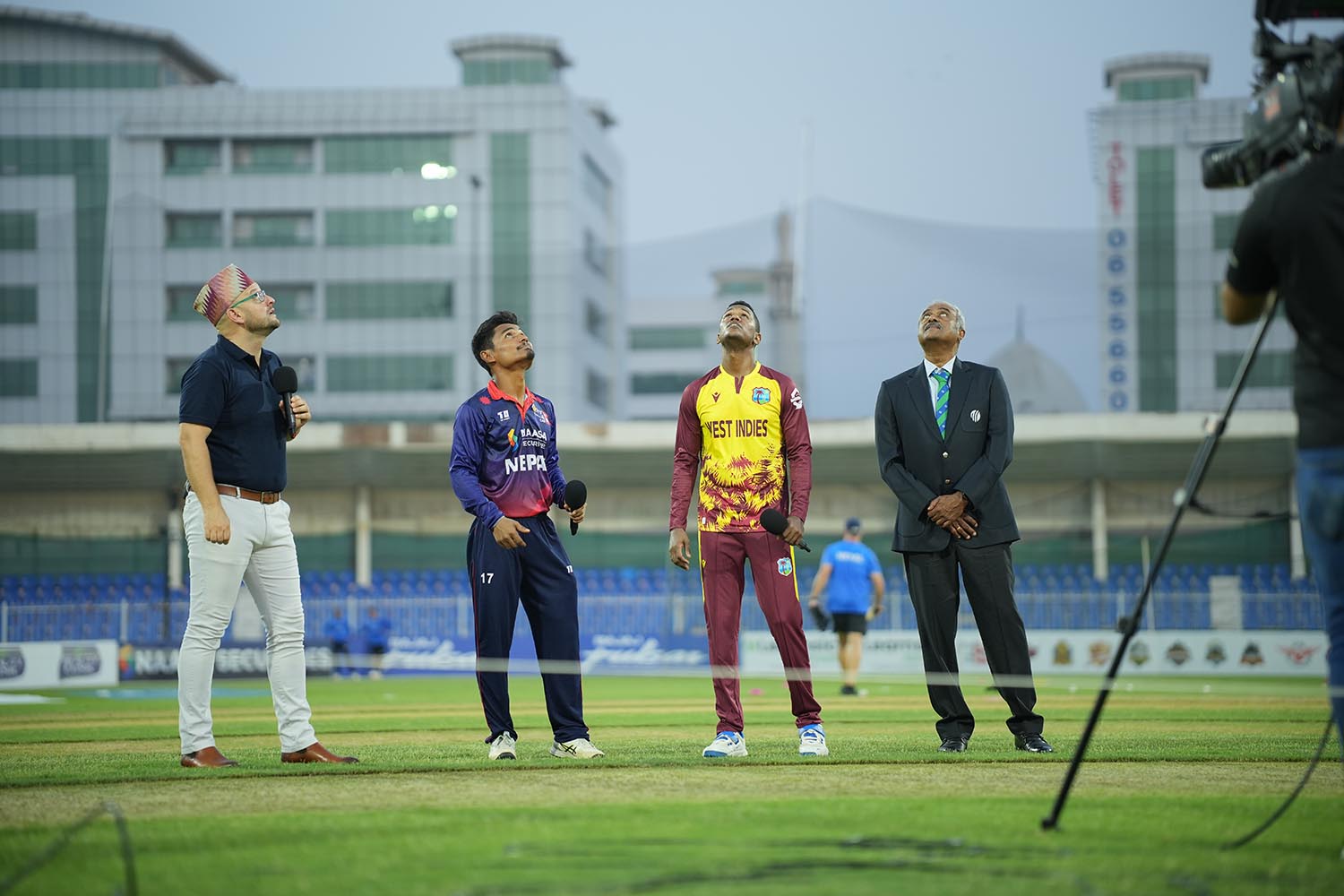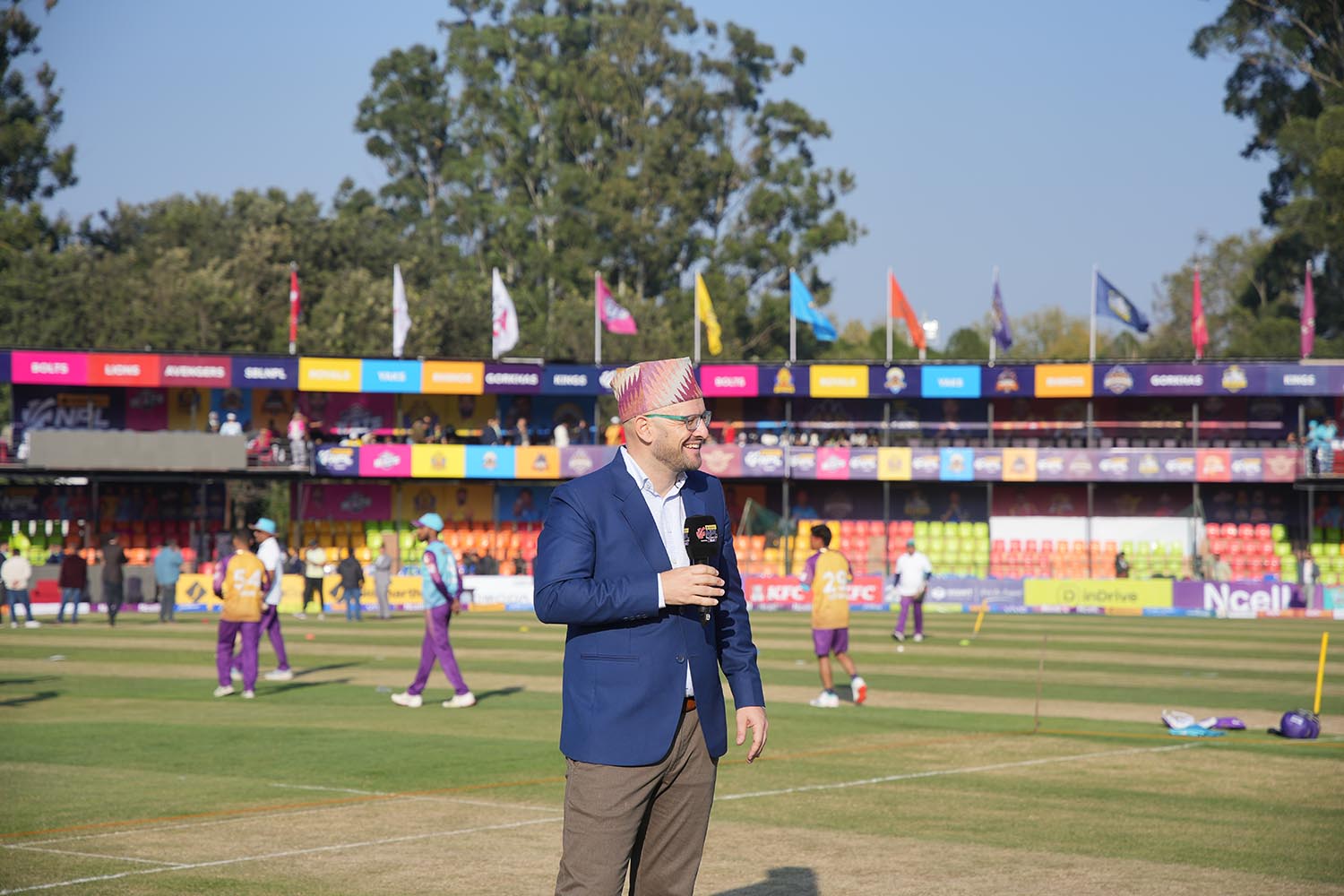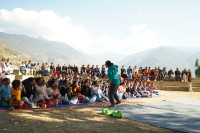Culture & Lifestyle
How an Irish cricket commentator fell in love with Nepal
An advocate for Associate Cricket, Andrew Leonard, aka ‘Taklu Dai’, says Nepal is close to a breakthrough in world cricket, with the Nepal Premier League providing fresh momentum.
Anish Ghimire
It was June 2023—the month when the ICC Cricket World Cup Qualifiers was taking place in Zimbabwe. The commentary panel, which included the likes of Ian Bishop, Carlos Brathwaite and Andy Flower, were having a pre-tournament dinner. Many of them that evening were discussing the participating teams. When the focus shifted to Nepal, experts at that dinner table turned to an Irishman to inquire about the young Nepali team.
Born in South Dublin, Andrew Leonard, in all his enthusiasm, went on about the Nepali team, from Dipendra Singh Airee’s fielding, the poise of Kushal Bhurtel, to the slog-hitting of Karan KC. He went with the flow, and “maybe a ten percent” too far, he admits, to which he got mocked many a time.
A few days later, Nepal took the field with the hosts Zimbabwe, and the Rhinos posted a magnificent 171-run opening partnership with Bhurtel top-scoring with 99. Soon after, when Leonard and Ian Bishop were sitting in the green room, the West Indian legend turned to him and said, “You know what, Lenny? I know you got a lot of slagging, but these Nepali boys are pretty special, aren’t they?”
But why would a panel of cricket experts turn to an Irishman to inquire about the Nepali team?
To understand this, we need to travel back to the early 1990s in Ireland, when a young Andrew Leonard was watching cricket on TV. The West Indies were taking on England and beating them handsomely, too. Leonard quickly took a liking to the brand of cricket played by the Windies—particularly by Viv Richards, Malcolm Marshall, and later by Brian Lara.
Obsessed, he “hassled” his parents to get him admitted to a cricket club, and they didn’t even know where that was. Later, with his brother’s help, they found one, and he was given a cricket bat for Christmas. “From then on, cricket became my life,” says Leonard with his trademark beaming smile as we sit at a cafe in Jhamsikhel.
He spent two seasons at Hampshire in the English County, playing in the Academy as a young cricketer. He then tried his hand at coaching, and later retired, believing, “you needed to be a famous former player to reach higher levels.” So, he made a shift into administration—first as a marketing manager at Cricket Ireland, then as a digital and social media manager at the International Cricket Council (ICC).
.jpg)
It was actually during his time at the ICC that he learned about Nepal cricket for the first time. There were multiple instances of the website crashing whenever Nepal played. “The volume of traffic coming from just one country was unbelievable,” he says.
Leonard eventually resigned from the ICC to return home and play one more summer of cricket in Ireland. That decision changed his life. At the time, matches in Ireland had simple livestreams and basic broadcasts. He didn’t volunteer, but he was pulled in because they needed a commentator. They said, “You’re Mr Cricket—you worked at the ICC and you know everything.”
That’s how his “accidental” journey into broadcasting began.
Then came 2018, the year when Leonard came to Nepal for the first time to commentate at the Everest Premier League (EPL). But it wasn’t without help. His close friend Kevin O’Brien, the former Irish player, had been picked to play in the EPL. Retired in 2022, O’Brien is often remembered for his century in the famous win against England in the 2011 World Cup.
O’Brien asked the EPL organisers about their broadcasting, and since no special arrangements had been made, O’Brien recommended his friend Leonard to come and commentate. “He told the organisers, ‘This guy will be great. He’s new, he knows the associate teams very well, he’s passionate about the game, and he’ll probably even know your players,’” Leonard says.
That same summer, Leonard had just done his first international commentary—Ireland against Afghanistan. “Kevin pushed hard for me. I think he partly wanted a drinking buddy for the trip,” he jokes.
And since then, Leonard fell in love with Nepal, and the Himalayan nation has loved him back.
To him, it’s simple. What sets Nepal apart from other associate nations is the passion of its fans. “There are countries where cricket is hugely popular with large playing bases, yet even they do not have the level of energy and devotion that Nepali fans show,” says the Irishman. “The people of Nepal, especially the young generation, are the country’s greatest strength. They are kind and hardworking. Their energy is infectious.”
Out of the many games he has called for Nepal, the March 16, 2023, game will always be a special one. The Rhinos were playing the UAE on their home turf. When Nepal pulled it off at the end by being ahead on DLS, Leonard’s famous words on air, “I think this could be the moment,” amassed millions of views on social media.
The win booked Nepal’s spot at the World Cup qualifiers, and it sent such huge tremors that World Cup-winning captain Eoin Morgan had texted Leonard saying, “That game looked incredible.”

Due to such instances, he believes that associate cricket has never been as strong, as visible, or as well-known as it is today. “We are finally seeing associate players being picked up in leagues around the world, and they deserve that recognition,” he says.
When it comes to Nepali cricket, ex-captain and incumbent CAN Secretary Paras Khadka “feels almost like a statesman,” Leonard says. From working with him, Leonard knows just how busy he and his team are and how much he has to juggle to make dreams like the Nepal Premier League (NPL) a reality.
For Khadka to push forward the upgradation of the TU ground and play a crucial role in developing a world-class stadium is, in Leonard’s words, “remarkable”.
The NPL, he says, has already set itself apart from any cricket tournament previously held in the country. “The brilliance of the design is that the whole nation is represented,” he says, adding that the league gives young Nepalis a sense of identity and belonging. Many 20-year-olds who leave home for education or work in Kathmandu now have a team in their colours, with their favourite players. “They get to go up to the stadium and feel like they are part of something,” he says.

This season in particular, he looks forward to the young players turning up—someone like Rijan Dhakal and Pratis GC. He believes that, despite the cynicism that sometimes surrounds the franchise leagues, they play a crucial role in developing players. They provide exposure to cricketers to new conditions, new coaching styles, and teammates from different backgrounds. Such an environment is helpful for young players, especially at the associate level, he adds.
In his view, Nepal today is in a position similar to where Afghanistan stood around 2015, when they played their first 50-over World Cup. “Nepal might even be slightly ahead of where Afghanistan were then,” he adds. But he also points out areas that still need improvement. Nepal lacks express pace, and outside of Gulshan Jha, does not yet have bowlers who can consistently generate bounce across different pitches. Batting against fast bowling, he says, also remains inconsistent.
Still, he feels the progress is clear and steady. “There are huge similarities to Afghanistan’s journey,” Leonard says. “There’s no reason Nepal cannot become the 13th Test nation and the next full member of the ICC.”




 16.89°C Kathmandu
16.89°C Kathmandu















